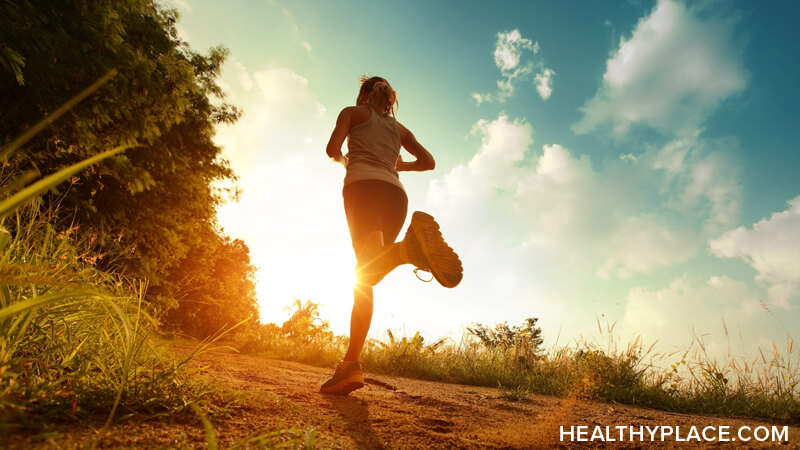Biohacking Bliss

In the aftermath of one of my mental breakdowns, a wise friend once told me that "sometimes you have to think your way into acting differently, and sometimes you have to act your way into thinking differently." I guarantee he didn't come up with this catchy phrase himself, but I give him full credit for introducing me to the notion that when it comes to changing your feelings, your body is as valuable of a mechanism as your mind. If your mind is already sour, thinking yourself into a more positive experience probably isn't an option. You're better off acting your way into thinking differently—or better: biohacking your way into thinking differently.
Biohacking Mental Health
Biohacking has become all the rage in fitness culture, but it's rarely talked about in mental health circles. In layman's terms, biohacking is making research-backed behavioral and dietary alterations to your lifestyle in order to achieve the desired outcome. People use biohacking to become more muscular, to focus longer and harder, and to improve their sleep, to name just a few examples. I'm a bit of biohacker myself, but I find it most valuable as it pertains to my head. What I'm talking about is biohacking bliss.
You may or may not be surprised to read that, despite its name, mental illness is as much a feature of the body as of the mind. Your "state of mind" is a physiological phenomenon; whether you're excited, angry, bored, or joyous, your feelings are being generated and perpetuated throughout each and every one of your bodily systems. We could argue about the chicken and egg of whether emotions begin in the body or the mind, but we won't. Let's leave it at the understanding that emotional experience can be successfully altered through ground-up strategies.
If you're looking for bliss and finding it difficult to get there through your thoughts, here are a few ways to hack your body to improve your mind.
5 Free Biohacks to Be Happier Today
-
Take a walk. Getting sunlight into your eyes is one of the best ways to keep your circadian rhythm—basically the internal clock of your body—on point. This helps your hormones and neurotransmitters to fire at the right times and in the right doses. Likewise, forward motion will put your eyes into a state called "optical flow," which calms your threat detection system, turning down the stress response.1
-
Drink a coffee and take a cold shower. Dopamine, not simply the "feel good" neurotransmitter, is the molecule of motivation, and motivation is a critical component of wellbeing. Caffeine (whether in coffee or otherwise) elevates levels of dopamine receptors, allowing you to feel more of this important molecule.3 If you're brave, couple a cup of joe with a cold shower. Studies have shown that cold water immersion can increase dopamine levels by 250 percent.4
-
Do some cardio. Raising your heart rate and getting your blood flowing can help put your body into a state of relaxed alertness by triggering a slew of beneficial physiological processes. Whether it's high intensity (high knees and sprints) or medium intensity (yard work or vinyasa yoga), doing even just a few minutes of cardio is a surefire intervention for anxiety, sorrow, and stress.5
-
Touch some nature. Contemporary living has plenty going for it, but one thing it lacks in spades is tactile experience. We were made to feel the world. Grass under our feet, tree bark under our fingertips, and rain and sun on our skin all ground us by providing information about our environment, which calms our amygdalas.6 So go ahead and release your inner hippie with some tree-hugging and barefoot walking.
-
Slow your exhale. Lengthening your exhale beyond your inhale slows your heart rate down and triggers your parasympathetic nervous system, the "rest and digest" counterpart to your "fight or flight" response.7 If you remember nothing else from this list, remember this one. We can't control much in life, but we can control the pace of our breath, and this can help us control our experience. Breathe in and breathe out slowly.
Sources
-
Forbes, B. (2022, April 3). Why Optic Flow Restores Us. BO FORBES. Retrieved October 23, 2022, from http://.boforbes.com/blog/why-optic-flow-restores-us/
-
Effects of Light of Circadian Rhythms. NIOSH. CDC. (n.d.). Retrieved October 23, 2022, from http://www.cdc.gov/niosh/emres/longhourstraining/light.html
-
Volkow, N.D., Want, G.J., Logan, J., Alexoff, D., Fowler, J.S., Thankos, P.K., Wong, C., Casado, V., Ferre, S., & Tomasi, D. (2015, April). Caffeine increases striatal dopamine D2/D3 receptor availability in the human brain. Translational Psychiatry, 5(4), e549-e549. https://doi.org/10.1038/tp.2015.46
-
Fuchs. M. (2022, March 10). Are ice-cold showers good for you? I tried it for two months. Washington Post. Retrieved October 23, 2022, from https://www.washingtonpost.com/wellness/2022/03/10/benefits-of-a-cold-water-immersion/
-
Borrega-Mouquinho, Y., Sanchez-Gomez, J., Fuentes-Garcia, J. P., Collado-Mateo, D., & Villafaina, S. (2021, February 24). Effects of High-Intensity Interval Training and Moderate-Intensity Training on Stress, Depression, Anxiety, and Resilience in Healthy Adults During Coronavirus Disease 2019 Confinement: A Randomized Controlled Trial. Frontiers in Psychology, 12. https://doi.org/10.3389/fpsyg.2021.643069
-
Harrison, L. A., Kats, A., Williams, M. E., & Aziz-Zadeh, L. (2019, February 5). The Importance of Sensory Processing in Mental Health: A Proposed Addition to the Research Domain Criteria (RDoC) and Suggestions for RDoC 2.0. Frontiers in Psychology, 10. https://doi.org/10.3389/fpysg.2019.00103
-
Komori, T. (2018, May 16). The relaxation effect of prolonged expiratory breathing. Mental Illness, 10(1). https://doi.org/10.4081/mi.2018.7669
APA Reference
Satterwhite, J.
(2022, October 24). Biohacking Bliss, HealthyPlace. Retrieved
on 2026, March 4 from https://www.healthyplace.com/blogs/livingablissfullife/2022/10/biohacking-bliss
